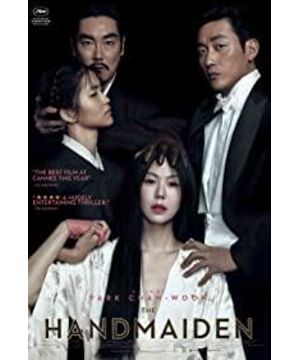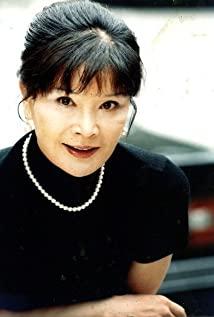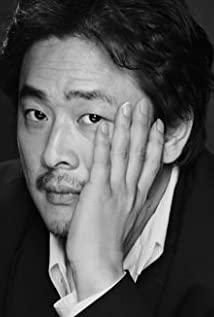Of course, I want to start with Park Chan-wook, because it was Park Chan-wook who aroused my desire to write this article. One of the most outstanding directors in Korea today made it clear after an interview at Cannes: Expressing women’s rights is my goal in making this film. . In the story of "Miss", Yuko destroys all the obscene books that symbolize oppression, patriarchy, and metaphysical nihilism under the collision of feudalism and capital. , this form of expression is destined to leave a heavy mark in feminist films.
Park Chan-wook, born in an ordinary family in Seoul, graduated from the Philosophy Department of Jiangxi University. He loves movies, but he did not dare to apply for the film major when he graduated from high school, because he felt that film directors are more suitable for rough men, and he is more suitable for a gentler personality." "Writing" work, so I chose to major in philosophy. However, it is such a calm and beautiful man who was influenced by Hitchcock's "Vertigo", but his works are full of violence, eroticism and a personal style of exploring absurd humanistic colors. His iconic lens language is also edited in the form of editing. Bold, the narrative line is sometimes chaotic and sometimes calm, the time and space are not unified, and the composition and tone are mostly European medieval style oil paintings. It is his personal "bad taste" and his unique audio-visual style that make him enjoy an important position in the international film industry, so that if there is South Korea on the red carpet at Cannes, there must be Park Chan-wook! By the way, the director who can bring the above elements together and play to the extreme is unique to the Park Chan-wook family today!
When did Park Chan-woo officially start paying attention to the theme of feminism? In my impression, "Stoke" is the first work in which Park Chan-woo's style is almost formed and describes women as the main point of view, and it is also my personal favorite Park's work In the work, the protagonist in the film has an Electra plot, but when he was about to kill his mother, he chose to save his mother. In fact, it was a major reversal. The bloodthirsty pervert died in the same gene but realized his personality. In the hands of a girl whose attitude has changed, adulthood brings the passing of adolescence. The protagonist interprets the abstract term of adulthood with a variety of actions, which are matched with completely different attitude changes at the same time. What a great screenwriter, Sydfield said: Action is character, change is ending. Under the standard routine, a change of times has been achieved. The feudal patriarchal ideology that the heroine Intia had before and the Electra plot of Electra and mother-killing disappeared with adulthood at the end, making the film aftertaste. Full of stamina to spare. It is exactly what Intia said before, "Ancient widows should mourning for their husbands for two years. If I were in China, I would build a thatched hut next to the tomb, live there for three years, and do nothing..." (interrupted by his mother later) Reminds me of those ancient feudal legal systems and rotten ritualistic culture.
Park Chan-wook, born in an ordinary family in Seoul, graduated from the Philosophy Department of Jiangxi University. He loves movies, but he did not dare to apply for the film major when he graduated from high school, because he felt that film directors are more suitable for rough men, and he is more suitable for a gentler personality." "Writing" work, so I chose to major in philosophy. However, it is such a calm and beautiful man who was influenced by Hitchcock's "Vertigo", but his works are full of violence, eroticism and a personal style of exploring absurd humanistic colors. His iconic lens language is also edited in the form of editing. Bold, the narrative line is sometimes chaotic and sometimes calm, the time and space are not unified, and the composition and tone are mostly European medieval style oil paintings. It is his personal "bad taste" and his unique audio-visual style that make him enjoy an important position in the international film industry, so that if there is South Korea on the red carpet at Cannes, there must be Park Chan-wook! By the way, the director who can bring the above elements together and play to the extreme is unique to the Park Chan-wook family today!
When did Park Chan-wook
officially start to pay attention to the theme of feminism? In my impression, "Stoke" is the first work in which Park Chan-wook's style is almost formed and describes women as the main point of view, and it is also my personal favorite Park Chan-wook. Shi's work, the protagonist in the film has an Electra plot, but when he was about to kill his mother, he chose to save his mother. In fact, it was a big reversal. The bloodthirsty pervert died in the same gene but realized In the hands of a girl whose personality attitude changes, adulthood brings the passing of adolescence. The protagonist interprets the abstract term of adulthood with a variety of actions, which are matched with completely different attitude changes at the same time. A very good screenwriter, as Sydfield said: action is both characters, and change is the ending. Under the standard routine, a change of times has been achieved. The feudal patriarchal ideology that the heroine Intia had before and the Electra plot of Electra and mother-killing disappeared with adulthood at the end, making the film aftertaste. Full of stamina to spare. It is exactly what Intia said before, "Ancient widows should mourning for their husbands for two years. If I were in China, I would build a thatched hut next to the tomb, live there for three years, and do nothing..." (interrupted by his mother later) Reminds me of those ancient feudal legal systems and rotten ritualistic culture.
The movie "Stoke"
As we all know, in the ancient slavery period in our country, the legal system was still in shape. As early as the Xia and Shang dynasties, there were "heavenly punishment" and "divine judgment", and later the Western Zhou Dynasty's legislative guiding ideology of "bright virtue and careful punishment", that is, "ritual", The legal characteristics of the combination of "criminal". The so-called "ritual" is a general term for a series of spiritual principles and norms of words and deeds that have existed for a long time in ancient Chinese society to maintain blood and patriarchal relations and patriarchal hierarchy.
So what did the original ritual include, and how does it relate to women's social status? Ritual has an abstract spiritual principle, which can be summarized into two aspects: "kiss" and "respect" in the Western Zhou ritual system. Leaving aside "respect", the so-called "kiss" in the Western Zhou Dynasty had the patriarchal patriarchal system of long-term, husband-righteousness, wife-listening, and "father-in-law". However, as a derivative of the family system, there is also the important principle of "no courteousness to the common man, no punishment to the doctor". Therefore, the legal basis for the universal significance of patriarchal center has not yet been formed. But in terms of the marriage system, there has been almost no substantial change in the subsequent three thousand years of historical development.
During the Western Zhou Dynasty, there were three principles for the conclusion of marriage, namely monogamy, non-marriage with the same surname, and parental mandate. In particular, it is the monogamy system here. Although a man in ancient times could have concubines and maids, there could only be one legal wife, the first wife. In other words, monogamy is a legal marriage, and the descendants cannot be confused. Only the children born to the wife are the direct line, the others are descendants, and they are in a relatively low position in the family relationship. However, this does not affect the institutionalization of women's status as early as 3,000 years ago.
Also in the Western Zhou Dynasty, the "six rites" were also a necessary condition for the establishment of marriage. What are the "six rites"? That is "Na Cai" (the man's family asks a matchmaker to send gifts to the woman to propose marriage), "Ask the name" (after the woman agrees, the man asks the woman's name and birthdate), "Naji" (choose a date to get engaged), "Nazheng" ” (the man gives the betrothal gift), “please date” (negotiates the woman to choose a date), and “personally welcomes” (marrys the woman). "As a formal element for the establishment of marriage in ancient China, since the Western Zhou Dynasty, an important part of the ancient ritual system of seating has been inherited by future generations. Looking at the results today, the cookie-cutter contracting model of a wedding company has long lost its traditional charm, and it is a pity that the dross in the ancient etiquette system is discarded together with the dross!
Besides, the dross of the system of returning rituals is notorious for the "seven out" and "three no-go" systems, that is, the marriage dissolution system in the Western Zhou Dynasty. The so-called "seven out", also known as "seven to go", refers to a woman who has one of the following seven conditions, her husband or in-laws can abandon her, that is, "disobedient to parents; no children; prostitution; jealousy. Go; those with bad diseases go; go talkative; go steal." Among them, disobedience to parents (in-laws) is "violent virtue", childlessness is no heir and no filial piety, sexual immorality is a disorder of the clan, jealousy is a disorder of the family, and those with evil diseases cannot share To sacrifice to ancestors, talking too much will alienate relatives, and stealing is the opposite, so it is one of the seven items of Fan, and the husband's family can abandon it. At the same time, the Western Zhou Dynasty also stipulated that there are three situations in which a woman may not be abandoned by her husband's family, that is, "three not to go" - "if you marry and have nowhere to go, do not go; and after three years of mourning, do not go; Rich, don't go." It seems that there are restrictions on men's arbitrary divorce, but it is actually a need to maintain patriarchal ethics. Under the patriarchal system, women's rights are only the epitome of restrictions. With the guidance of thinking and legislation, in the traditional laws of later generations for thousands of years, the provisions on marriage dissolution have not exceeded the "seven out" and "three no-go". The scope of the law, which seems to be the fundamental basis for moral norms, has never been implemented without getting rid of the fundamental fact that women are in an oppressed position.
Let's talk about the prototype of the ancient inheritance law, which originated from the first-born inheritance system in the Western Zhou Dynasty. In the early Shang Dynasty, the inheritance system of the coexistence of the father and the son and the brother and the younger brother coexisted. In the late Shang Dynasty, the eldest son succession system was formally established. The Western Zhou Dynasty established the patriarchal system, and at the same time, it was to solve the problem of power and position, inheritance of clans, and inheritance of property from the emperor of Zhou down to the nobles at all levels. The so-called eldest son inheritance system means that the territory and status of the lords at all levels can only be inherited by the eldest son of the eldest wife. There are so-called "rights". Naturally, women cannot inherit "rights". However, for the sake of dignity and connection, most of the nobles give women optimistic dowries, which are also just gifts from fathers and brothers, not legal rights. Such a system continued until the end of the Qing Dynasty and even The legal system in the early Republic of China did not completely eliminate discrimination against women in inheritance laws. As a digression, Mr. Liu Baorui's cross talk work is called "The Waxing Driller", which satirizes the collision between the inheritance system in feudal society and the idea of patriarchal piety under the traditional filial piety ethics, which can be described as the awakening of feminism before the century. masterpiece of art.
Since the establishment of the patriarchal system in the Western Zhou Dynasty, the basic legal guiding ideology that focuses on the social status of women has been used by later generations, whether it is the promulgation of written laws in the Spring and Autumn Period, or the "distribution of laws to the public" in the Warring States period, or a series of reforms in Shang Yang, The series of stages in China's transition from the ritual system to the legal system are mostly dominated by the reform of criminal law. The Qin Dynasty also only put forward the legislative guiding ideology of "rule by law", "laws are unified", and "severe punishment and heavy law". In other words, the civil legislation still continued the series of patriarchal systems of the Western Zhou Dynasty. The Han Dynasty proposed to depose a hundred schools of thought and respect only Confucianism. During the Three Kingdoms, Jin, Southern and Northern Dynasties, the "Ten Serious Crimes" were promulgated, and the Sui Dynasty revised the ten articles to "Ten Evils". The deliberate legalization of the status of women again belongs to the "unharmonious" crimes of the "ten evils", that is, the crimes of murdering or selling cannabis relatives and above, beating or reporting on husbands and seniors above the merits. This crime has become the legal basis for men to oppress women and women cannot obtain legal rights to resist.
In the era of the integration of ancient Chinese legal system and Chinese legal system, that is, the Tang Dynasty, the related systems of marriage, family and inheritance were combined with criminal laws. In the marriage system, the right to marry the elder over the younger was confirmed, and if violated Those who honor the will of elders, according to the law, "take 800"; the marriage letter, the hiring of wealth is an essential requirement for the establishment of marriage, and "the person who has reported the marriage letter and has a private contract but regrets it, will rely on 60." What is irritating is that "the female family's family" Self-repentance, fight for sixty", and "the male family regrets oneself, do not sit"; there is also the restriction of marriage policy that the same surname is not allowed to marry, it is strictly forbidden to marry a fugitive woman, and prison officials are not allowed to marry a prisoner's daughter as a concubine. There are many provisions that protect women and discriminate against women, but they are still based on the premise of women's low social status. Regarding the continuation of the principles of marriage dissolution formally established by the Western Zhou Dynasty in the Han Dynasty, namely the "seven out" and "three no-go" principles, in the Tang Dynasty, "righteousness" was newly added as a compulsory divorce condition. According to the records of "Tang Lu Shu Yi • Household Marriage", in short, if one of the husband and wife beats the other's parents, grandparents and other relatives and brothers, sisters, or husband and wife grandparents, maternal grandparents and other relatives and sisters, brothers Those who kill each other are regarded as "righteous", "violators will be punished for one year". It is worth noting that "if the wife commits adultery and desires to kill the husband" is an additional condition for women. In the Tang Dynasty, there was also a regulation of "reconciliation and separation", that is, "if the husband and wife are not in peace and harmony, they will not sit down." This article can be considered as a breakthrough provision in the Tang Dynasty regarding the freedom of marriage, and it is also one of the representative progress of the Tang Dynasty as the pinnacle of the ancient legal system. Even if there is progress, and the status of women has not improved at all, in half, the further exploitation of women and some changes to women's freedom of marriage are really a fifty-step smile.
Regarding the inheritance system in the Tang Dynasty, it was nothing more than a further legalization of the inheritance system of the firstborn in the past. However, unlike the Western Zhou Dynasty, the Tang Dynasty adopted the principle of priority of wills, which is also a great progress. "Provisions: In a "household absolute" home, the virgin can share half of the unmarried brother's property as his own dowry expenses. This legislated the dowry system, but there was still no progress in the acquisition of inheritance rights.
In ancient criminal legislation, there has never been any substantial progress in the protection of women, and women have been living as a group that has been ignored and even discriminated against for generations. The criminal law provisions of the Yuan Dynasty originated from the Yuan Dynasty.
Like the previous dynasties, the rulers of the Yuan Dynasty still regarded maintaining the ruling order as the primary goal of the legal system. Therefore, "Da Yuan Tong System" still lists the "ten evils" in the first article. However, it is worth noting that in the Yuan law, although the Yuan people said that "rapists and strong, the punishment is serious", but they also divided "rape" as rape, and for the first time in Chinese history stipulated that "those who rape young girls, Execution, although with the same strength, women do not sit. Anyone who is called a young girl, only under the age of ten.” The special protection of the personal rights of young girls is of great significance for progress.
On the contrary, it is a pity that, since the Yuan Dynasty, the status of women in civil legislation has been on a downward trend. Regarding the marriage system, the Yuan Dynasty stipulated that the marriage certificate is a statutory formal requirement, while the Ming and Qing Dynasties only continued it as a custom. In addition, the Yuan Dynasty standardized the management of matchmakers, made them professional, and had to pay taxes to the state. As for the provisions of previous dynasties: the law allows remarried widows to take away the original dowry, while widows are not allowed to take away, only the estate of the deceased husband. As for the Yuan Dynasty, it was officially stipulated that if a divorced woman or widow remarryed, she would lose the makeup and other inherited property originally obtained from her parents, as well as the property of her husband's family. Not to be taken away. In the Ming and Qing dynasties, there were regulations that "for those who remarry, the property of the husband's family and the original make-up should be given priority to the family of the ex-husband." As for the further decline of women's status, the provisions of the inheritance law are the basis.
about the right of marriage. In ancient my country, it actually existed for a long time. Although there was no legislation, Chinese parents have been in control of this power for thousands of years. It was not until the Ming Dynasty that the right to marry in the hometown was officially established in law. Marriage". If the marriage itself is illegal, it is also the parents and grandparents who are prosecuted. On women's rights to arranged marriages. In the Ming Dynasty, both legal and social practice reached a peak, which fully demonstrated the further strengthening of family-orientedism in the later period of feudal society.
The history of the ancient Chinese legal system will also transition to the development of the modern legal system. By the end of the Qing Dynasty, due to the resistance of the people and the interference of imperialism, the rewriting and re-creation of laws have undergone great changes. For example, China's early civil code "Draft of Civil Law of the Qing Dynasty" was nominally under the banner of civil law, and its core was still a law full of Confucian ethics to safeguard feudal rule. At this time, there was no progress in women's rights and interests. Just as the "Imperial Qing Dynasty Business Law" stipulates the ability of businessmen, men over the age of 16 can be independent businessmen, and women can only conduct business if "there is no father or brother or the business is disabled and the children are young and have not yet grown up". Only in business can a married woman do business, not only with her husband’s permission, but also in the event of a financial and debt dispute, the husband cannot abstain from his responsibility. In fact, it does not recognize the independent social status of women. Afterwards, the battle of etiquette and law paved the way for China's legal system to enter the modernization and revolutionary wave.
The series of law-cultivation activities in the late Qing Dynasty also hinted at the disintegration of the Chinese legal system. At the same time, feminist movements around the world have gradually developed. British women in the Victorian era made very tragic sacrifices in order to obtain the right to vote, and the struggle for rights in modern times has intensified. When the People's Republic of China was founded in 1949, women also gained the right to vote. As early as in 1934, the Marriage Law of the Chinese Soviet Republic was promulgated, and in the early stages of the process, sharp debates were made on the protection of the interests of children after divorce, and it refuted the feudal husband's rights. It specifically included the basic principles of freedom of marriage and stipulated that The substantive and formal requirements for marriage and divorce are that both parties are willing and reaching the legal age. Divorce is also a voluntary principle. After divorce, property is divided equally between men and women. And to protect military marriage, that is, if the wife of a Red Army soldier asks for a divorce, her husband must agree. This had a significant impact on future marriage and family legislation and became a representative regulation at that time. The promulgation of the "Marriage Law of the Chinese Soviet Republic" broke the shackles that bound women for thousands of years, and the majority of women were liberated from the barbaric feudal marriage system. The realization of the freedom of marriage between men and women and the establishment of a new democratic marriage system is a major change in the history of Chinese family and marriage.
Later, the marriage legislation before the founding of the People's Republic of China mainly showed special wartime characteristics. As for the conditions for divorce, the 1943 "Shan-Gan-Ning Border Region Anti-Resistant Divorce Measures" added that during the woman's pregnancy and childbirth, the man could not get a divorce. For child rearing and education after divorce. The responsibility for the support of the woman's remarrying new husband is determined. Ensuring the legitimate interests of children born out of wedlock. Marriage legislation liberated women, free, independent, voluntary marriage became the marriage creed, and love, equality, and will replaced arrangement, oppression, and money.
Until modern times, women have achieved real liberation. In the long history of more than 3,000 years, but only less than a hundred years of history, the imprisonment of ideas cannot be completely reversed in a short period of time, but since the promulgation of a series of departmental laws of the People's Republic of China and Amendment, we can see that women's rights and interests are constantly being improved in the process of my country's contemporary legal system construction, and the legal embodiment of equality between men and women is also improving day by day. It is only a matter of time before people's minds are open. However, the struggle for women's rights has never been in the middle, and even if the inequality between men and women is not stated in the legal provisions, people's subtle patriarchal thinking has not completely changed, and there is still a long way to go to achieve real substantive equality. Therefore, people like Park Chan-wook who have the right to speak in art hope that they can shoulder the responsibility of guiding the audience's thinking and bring feminist films or other art forms to the audience, so that people in the world can be influenced by the simplest forms. , to be an active part of the realization of equality between men and women!
View more about The Handmaiden reviews











